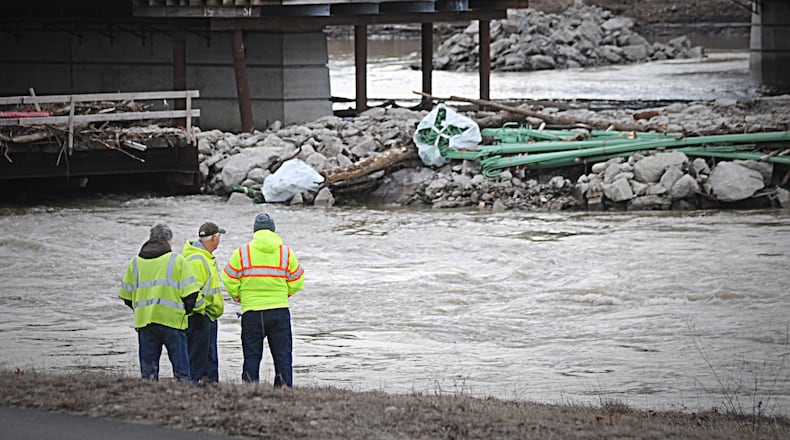The city alleges that while building the new Keowee Street bridge, the Sidney-based company improperly designed and built a causeway and failed to properly armor the banks of the river, which led to erosion and the rupture of a 36-inch water main.
The company’s response, filed by its attorney Paul D. Eklund, claims the temporary causeway was approved by Montgomery County, which contracted with the company to build the bridge, as well as the Miami Conservancy District and the Army Corps. of Engineers, which permitted the project.
The company is asking Judge Mary E. Montgomery to dismiss the case with prejudice at Dayton’s cost.
The company admits it was contractually required to protect utilities located within the construction limits, but contends the break occurred outside those limits, according to the court document filed Monday.
Eklund declined to comment on the lawsuit when reached by the Dayton Daily News Thursday.
Eagle Bridge’s response further claims the damage was a result of an unforeseeable weather event.
The river was at flood stage at the time of the break. Due to its location in the river, crews had difficulty finding the break, which resulted in the loss of more than 150 million gallons of treated water, according to the city.
Tens of thousands of area residents lost water entirely during the Feb. 13, 2019 outage that rippled throughout the county. A countywide boil advisory affected 400,000 people for more than 40 hours. Schools and businesses closed.
The pre-stressed concrete water main was installed in 1990 and was expected to last 75 years, according to the city’s complaint.
The city requested a jury trial and claims that in addition to damages exceeding $2 million, it is owed for injury to its reputation, which could impede the city from gaining future water customers.
John Musto, Dayton’s chief trial counsel, said last month the water department had an “unblemished record going back 100 years” until the February 2019 main break.
“The Dayton Water Department is constantly trying to expand to additional clients, which both will improve their financial situation and reduce the rates for Dayton’s ratepayers,” he said. “So this negatively impacts the ability for the Dayton Water Department to go get ratepayers when we have a water outage like this.”
Montgomery County, which hired Eagle Bridge Co. to replace the bridge, is not named in the lawsuit, nor is the Miami Conservancy District or Army Corp. of Engineers, both involved in the permitting process.
A pretrial conference is scheduled for Wednesday.
Construction began in 2017 to replace a then-86-year-old Keowee Street bridge linking Dayton and Harrison Twp. to the north. This week, Montgomery County Commissioners agreed to pay Eagle Bridge an additional $175,334 for change orders, bringing the total paid the company for the new bridge to $9,027,928, according to the county.
Less than three months after the February 2019 break, residents were again without water when Memorial Day tornadoes knocked out the power to the city’s two water plants. Just last week, a large main gave way at Keowee and Ottawa streets, leaving some neighborhoods in the city without water and others with low pressure and under a boil advisory.
Dayton’s system provides drinking water to most of Montgomery County. In addition to those in Dayton, businesses and residents in Centerville, Kettering, Harrison Twp., Riverside and Trotwood use water pumped and treated by the city. The lines also serve part of Greene County and extend to the Dayton International Airport.
About the Author

